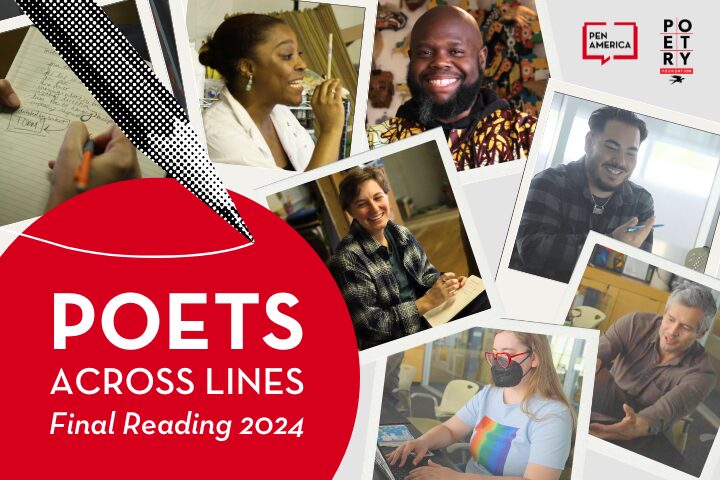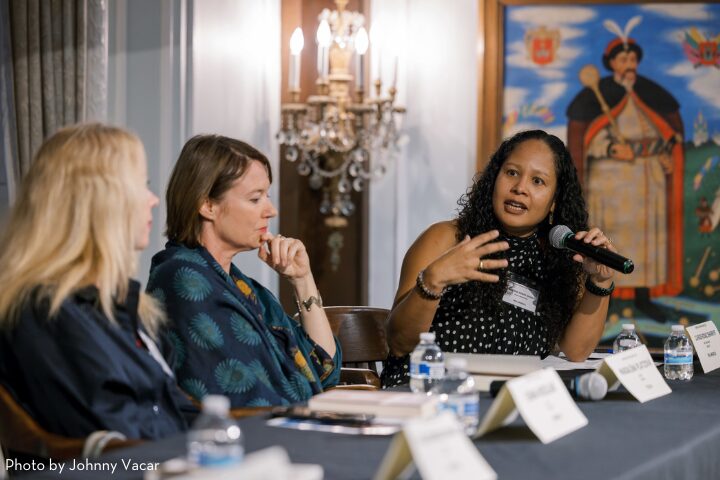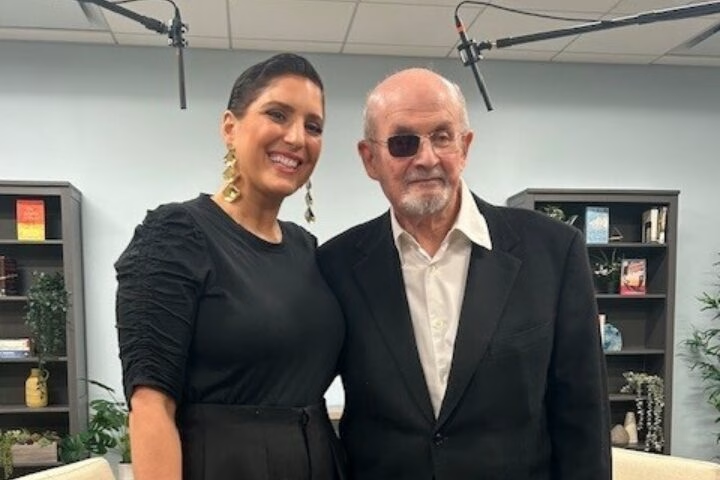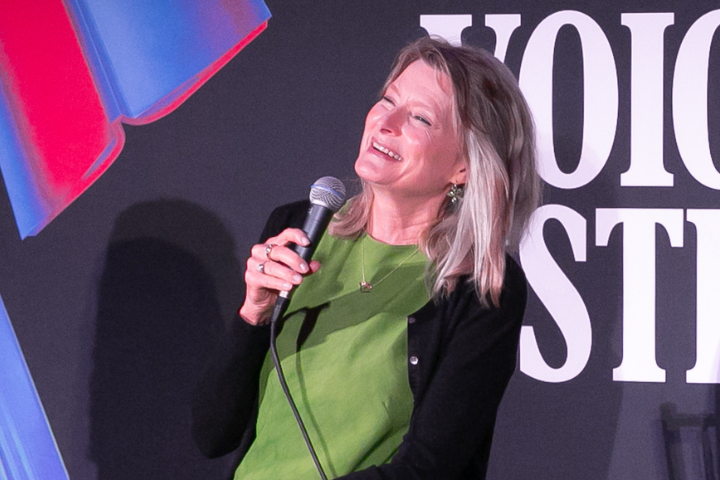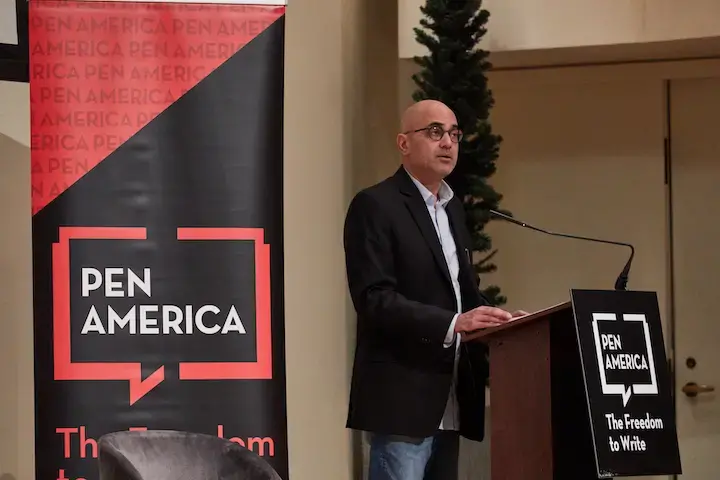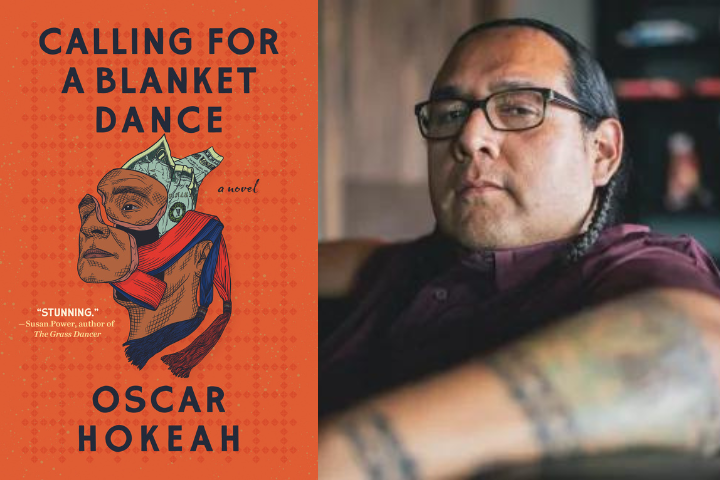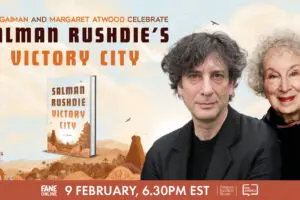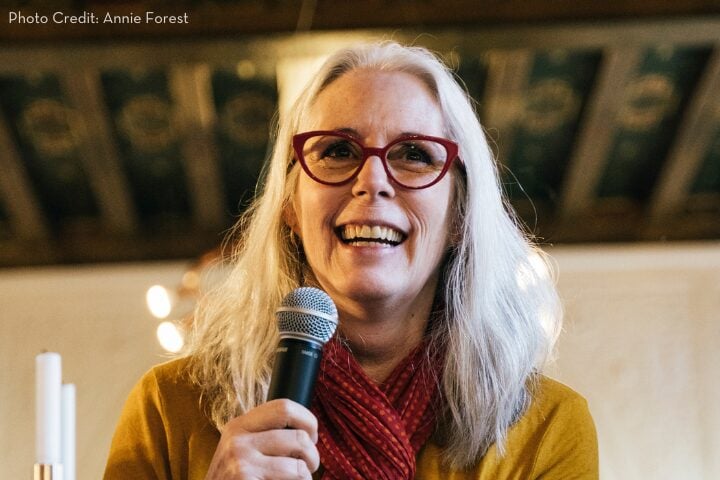
When Laurie Halse Anderson writes books for the young, she also leaves a note: When life is hard, books help. In some ways, it’s a note to self. Being a children’s book author today is hard, especially being constantly targeted by book banners across the country. But with long walks, young women writers, and strong literary characters like Pippi Longstocking, Anderson maintains hope.
The latter is who Anderson, author of Speak, Chains, Shout, and forthcoming Rebellion 1776, was celebrating at the Swedish Residence in New York. As Pippi Longstocking, the iconic character written by Swedish author Astrid Lindgren, turned 80, writers, publishers and advocates, including Jamia Wilson and PEN America’s Jonathan Friedman, came together to talk about book banning and other threats to children’s literature today. We caught up with Anderson, a 2023 Astrid Lindgren Memorial Award winner, ahead of the panel, to discuss the current political climate, ways to combat book bans, and her new book out next month.
What is your relationship to Pippi Longstocking?
Pippi Longstocking is the fictional character that gave me permission to think about being a strong girl. I can remember reading how she picked up the horse, and then, in that first book, she picks up the bullies, and she picks up why she picks up everybody, and she does it in a way that doesn’t hurt them. And she’s always just cheerful and so strong, which was a shock to me, and a delightful shock. And then I became a strong girl, too.
What inspired you to start writing?
My mother would tell you that I have an overactive imagination, which I think she should take credit for. It wasn’t that I started writing; it was that I never stopped as soon as I could form words. I used to get in trouble a lot when I was a kid because I had a hard time sleeping. And I would lay awake and I would tell my mom I have movies in my head, so I was always making stuff up, and then they taught me how to use a pen and a pencil, and that was who I am, what I do.
We are here for a character who was created before most of today’s grandparents were born. What does it mean to be a children’s writer now?
To be a children’s writer in the United States today is very difficult. The book banning is absurd and has gotten out of hand. I mean, not that any book banning is not good. The people who have taken my books, and the books of my friends, out of schools and school libraries do it under the pretense that they’re they’re protecting children from pornography, which is bizarre when you look at the fact that I write books about the victims of sexual violence. They talk a lot on the other side about “parents’ choice,” but what about the parents who want their kids to read books about kids from different backgrounds, about kids who are gay or have gay parents, or what if someone’s been a victim of sexual violence themselves, and they want to read a book where somebody who’s been through that experience is fighting for their their recovery and trying to find their voice?
It’s incredibly disheartening. It’s especially disheartening for me because in children’s publishing, we were just beginning to open the door to all kinds of authors, to all kinds of creators. We Need Diverse Books is the most important thing that’s happened in children’s literature in decades, and I have friends who are Black, who are brown, who are Muslim, who are gay, and their books are being taken out, and their careers are going to end if all the censors get their way. And so people began to find their voices, and then boom! comes the fist of authoritarian tyrants. And at the bottom of it all are our children who still need stories, who still need books, and they’re the ones who suffer the most.
What is one message you’d like to share with young readers?
I sometimes write this in a book. If I’m writing a book to a teenager, I put the message, “‘When life sucks, books help.”’ And then I would probably say that without saying suck to younger kids, “‘When life is hard, books help.”’
How are book bans affecting the work that you do?
Book banning spiraled me down into a very profound and dangerous depression for a couple years. Thanks to the Astrid Lindgren Memorial Award that I was very honored to receive in 2023–that helped breathe life back into my soul and brought me back to the table. My income has been cut by two-thirds, probably, but I’m an older person, my kids are grown, so we’ll make it. Don’t worry about us.
What the award did for me in terms of the censorship and the damage being done to children’s literature – it strengthened me. It reminded me that Pippi taught me how to be strong, and I have to pick up horses again, and we can do that together.
What do you think people can do to combat book bans?
I think the most important way to fight book banning, first of all, is to laugh at them. It’s just like, wait what? Excuse me, you’re serious and, and just have honest, kind of low-key, friendly conversations in families, in church groups or temple groups or mosque groups, wherever you’re with people that were there because you have something in common with. There’s a lot of people in the United States who I think have been manipulated by lies, and we have to build bridges to people we disagree with, which can be hard, because we just want to scream sometimes. But if we care about our country, if we care about all of the children in our nation, then we have to be grown ups, and we have to start building those bridges and have conversations.
Here’s what it boils down to with the book banning. Every parent, every guardian of a child, has the right and the responsibility to keep an eye on what that kid is reading. Keep an eye on what that kid is watching. Right? That’s your job. They don’t have the right to keep an eye on what other people’s children are reading. There are plenty of parents who want their kids to have access to the books that are being banned, and so we have to figure out how to have conversations about those things. We have to speak up.
What makes a children’s book icon like Pippi Longstocking so special?
I feel like she’s so real, like I can almost feel her like, right here next to me eating gingerbread cookies together. I think she takes, in my mind at least, her place in a wonderful line of characters that we saw, going back to the characters in Little Women that were written by Louisa May Alcott. And then there’s Anne of Green Gables. And then there’s the Little House on the Prairie books. And then there’s Pippi. And now we have authors I would love to see the librarians of America come up with a great poster or something on a website to show the authors who are creating characters today that are filling sort of that Pippi-like role in children’s hearts. I’m thinking of authors like Meg Medina and Kelly Yang and Nic Stone and Angie Thomas and Sharon Draper, Kekla Magoon, Renee Watson. These are all important female authors of literature that are writing today’s Pippis, and in another 80 years, some of their characters are going to be the iconic characters that people are asking about.
You have a new book out next month. What was the inspiration behind it?
So the new book is called Rebellion 1776 and I wrote it because I got COVID in the early days of the epidemic, and as I was recovering from that, I looked up Abigail Adams, another iconic figure that people would really like a lot. Abigail Adams during the summer of 1776 had herself and her children inoculated—inoculations are an early form of vaccination against smallpox, a killer disease that was an epidemic in America. And I was like, what is going on here? So I had to learn more about Boston in 1776 and I saw kind of a shadowy mirror that seemed very familiar, because it was a time of tremendous political divide, where families were being separated because of who they wanted to support, the king or new America. And then there was this controversy about, do we get our children vaccinated, inoculated against smallpox, which also sounds very familiar.
What I’m always focused on, especially when I write in historical fiction, is the young kids who are surviving it. Because the children and teens who survived our revolution were our first generation of Americans, all of them, and so to look at at the experiences of that war for the kids who had a life of privilege, for the kids who didn’t have any any kind of privilege at all, I wanted to understand what those events felt like to them. So it’s a book that opens up with cannons blasting Boston and focuses on the power of love and the power of friendship.
How has your writing been affected by today’s political climate?
I have to take more walks now than I used to. You know when, when you’re going through hard times, especially if depression has been a part of your life, you have to be super healthy. So I take a lot of long walks, and that’s where the ideas start to come. So I’m going to be in great shape when I’m 100.
The challenge of being a writer is to stop thinking and let the art bubble out. Don’t over analyze it, just let the art bubble out of your soul, which is even more of a challenge when times are hard. Pippi Longstocking was written by Astrid Lindgren during the Second World War. Now, Sweden wasn’t occupied by Germany. Their position was a little bit unique, but it was still a very scary and threatening and uncertain time. And so maybe times that feel challenging are the times that push us to create the art and let the art bubble out.

